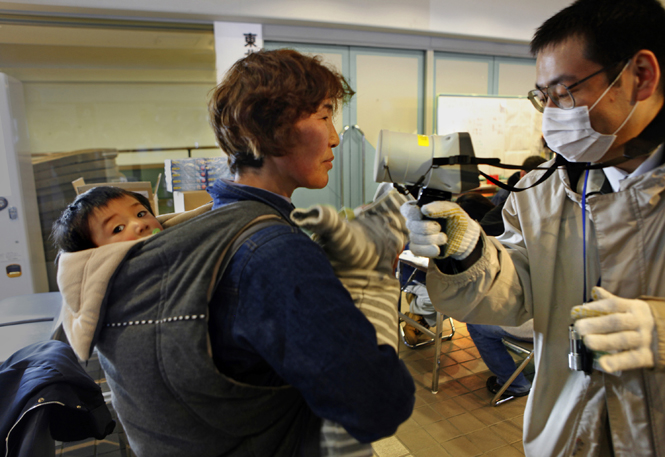KSU professors on Japan’s possible nuclear meltdown
At the Yamagata Sports Center, residents of Fukushima are screened for radiation when they check into the displaced persons center, Wednesday, March 16, 2011. Here, Yukiko Fushimi, center, gets checked along with her two grandchildren, but none of them showed elevated levels. (Carolyn Cole/Los Angeles Times/MCT)
March 16, 2011
In the past week, the Japanese have struggled to prevent a nuclear meltdown from occurring at the damaged nuclear power plant in Fukushima.
When the magnitude 9.0 earthquake and tsunami struck the coast of Japan Friday, they damaged the nuclear plant, destroying the cooling processes needed to keep the nuclear materials safe.
Since then, the plant has been at risk of leaking its contained nuclear materials in a meltdown, said James Gleeson, chair of the physics department.
Gleeson said a meltdown occurs when a nuclear plant is unable to cool down the contained materials.
“You always have to be removing the heat from the inside of the reactor,” he said. “But when that doesn’t work, when you can’t circulate the cooling material, then the inside of the reactor gets hotter and hotter. And if it gets too hot, everything will melt.”
Todd Schneider, a spokesperson for First Energy Corp. in Ohio, said when the earthquake and tsunami struck, they wiped out the electricity going to the plant, causing many Japanese homes to lose power.
“The tsunami and the earthquake caused the Japanese plant to lose electricity coming in from outside the plant, as well as their diesel generators,” Schneider said. “Which generate electricity to supply the emergency power systems.”
Schneider said the Japanese are now working to cool the systems in the absence of the generators.
“Without electricity or power in the emergency systems, the reactors began to overheat,” he said. “There was some fuel damage and now the Japanese are flooding the reactors with water and a special chemical that will curtail the nuclear reaction.”
Tom Schmidlin, geography professor, said although the potential damage of the meltdown is alarming, the nuclear plant is built to handle this type of disaster.
“Some people try to compare it to the Chernobyl in Russia years ago,” Schmidlin said. “But that was a very crude nuclear power plant in Russia, and the Japanese plants and American plants…we have much safer plants.”
Gleeson said he is relieved the nuclear plant in Japan has yet to meltdown.
“I think everyone’s grateful that the real catastrophic failure so far hasn’t happened,” Gleeson said. “And we can all be hopeful that it doesn’t.”
Contact Kelly Tunney at [email protected].












